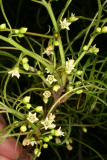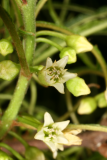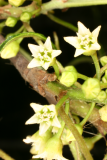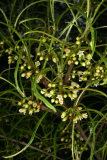Additional notes (click to expand)
Medicinal
Rhamnus frangula L. Rhamnaceae 'Asplenifolia' Alder Buckthorn. Deciduous shrub. Distribution: Europe, North Africa and to China. Rhamnus purshiana is the source of Cascara sagrada a powerful purgative. Rhamnus is the Greek for spiny shrubs; frangula is the Latin word for Buckthorn. Dodoens (1554) calls it Fragula and in Lyte's translation he calls it Black Aller (sic) or Alnus nigra and says that the bark soaked in wine and drunk causes profuse vomiting, and boiled in vinegar and applied to the scalp, cures scurf; cattle that eat the leaves, he reports, produce more milk. It contains anthraquinones, the same chemicals as found in Senokot. It is licensed for use in Traditional Herbal Medicines in the UK (UK Medicines and Healthcare Products Regulatory Agency (MHRA)).
Oakeley, Dr. Henry F. (2013). Wellcome Library notes.
link
Nomenclature
Syn. = Rhamnus frangula 'Aspleniifolia'
The Royal Horticultural Society Horticultural Database, available at www.rhs.org.uk
Dodoens (1554) calls it Fragula and in Lyte's translation he calls it Black Aller (sic) or Alnus nigra
Lyte, Henry. (1578). Nievve Herball or Historie of Plantes.
Toxicity
The species, Frangula alnus, is poisonous unless stored for 12 months before use. This report is probably referring to the bark. Do not use in cases of intestinal obstruction, stenosis, atony, inflammatory colon disease, appendicitis, abdominal pain of unknown origin. Avoid long-term use. Two weeks recommended under medical supervision.
Plants for a Future (2016) at www.plantsforafuture.org.uk http://www.pfaf.org/user/Plant.aspx?LatinName=Frangula+alnus
link
Harmful to humans and pets if eaten. HTA Guide to Potentially Harmful Plants
Frangula alnus 'Aspleniifolia'
Family: RHAMNACEAEGenus: Frangula
Species: alnus
Cultivar: 'Aspleniifolia'
Distribution summary: Garden origin
Habit: Shrub
Hardiness: H5 - Hardy; cold winter
Garden status: Not currently grown
Flowering months: May
Reason for growing: Medicinal, toxic, traditional herbal registration
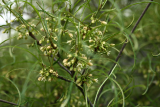
.JPG)
.JPG)
